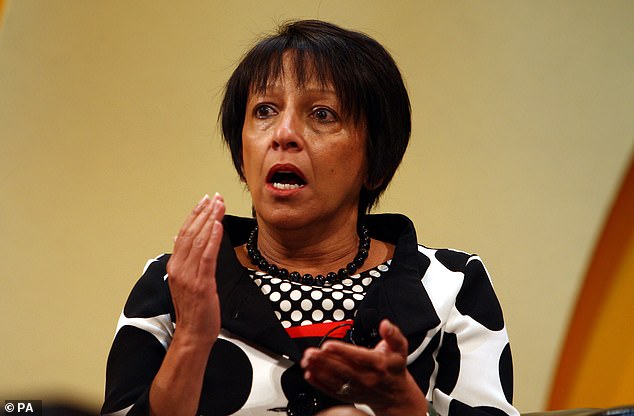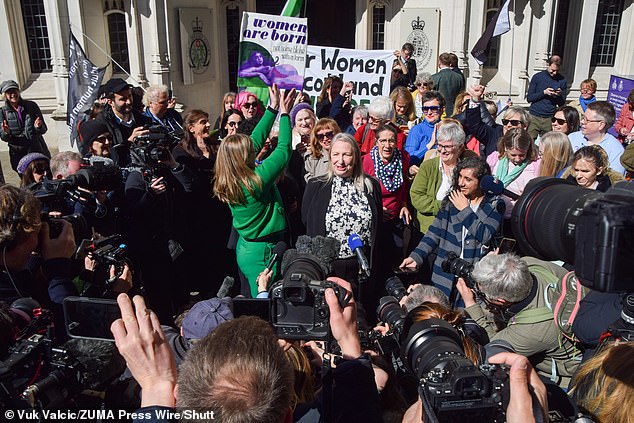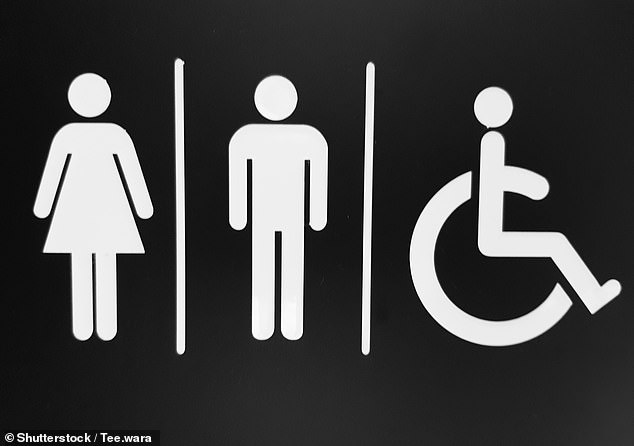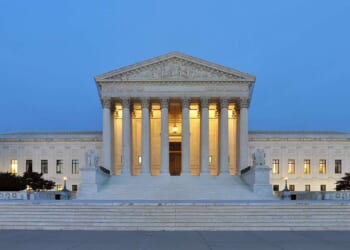Transgender women will be barred from female bathrooms and sport, an equality chief said today – as lawyers suggested they could be asked to use disabled bathrooms at work.
The Supreme Court‘s ruling that the definition of a woman in equality law is based on biological sex means trans women with a gender recognition certificate (GRC) can be excluded from single-sex spaces if ‘proportionate’.
Equality and Human Rights Commission (EHRC) chairwoman Baroness Kishwer Falkner has described yesterday’s ruling as ‘enormously consequential’ and she vowed to pursue organisations which do not update their policies.
On issues such as toilets, changing rooms and sports, Baroness Falkner echoed the Government in saying the ruling had brought ‘clarity’ to providers on their duties under equality law around single-sex spaces.
Asked if it was now simple that trans women cannot take part in women’s sport, she told BBC Radio 4’s Today programme: ‘Yes, it is.’
On changing rooms and toilets, Baroness Falkner said: ‘Single-sex services like changing rooms must be based on biological sex.’
She said there is no law against organisations providing a third space such as unisex toilets and suggested trans rights organisations ‘should be using their powers of advocacy to ask for those third spaces’.
The commission is expecting to lay an updated statutory code of practice before Parliament by the summer, and has said it is working ‘at pace to incorporate the implications of this judgment’ into the code for public bodies setting out their duties under the Equality Act.

Equality and Human Rights Commission (EHRC) chairwoman Baroness Kishwer Falkner has described yesterday’s ruling as ‘enormously consequential’
Baroness Falkner said the commission evaluates when the law is not followed by organisations and can speak to those bodies, or ‘use enforcement, compliance tools or whatever, we will be continuing to do that’.
Regarding single-sex hospital wards, she said the NHS will ‘have to change’ their 2019 policy, which says that trans people ‘should be accommodated according to their presentation’.
While the implications of the judgment are still being worked out, today a string of organisations came forward to reveal changes to their policies.
This includes the British Transport Police (BTP), which said it had adopted a new ‘interim position’ which will see trans people held in custody searched by an officer in line with their birth sex.
Businesses will likely have to review and change policies, including on toilets, in light of the Supreme Court ruling, according to lawyer Peter Byrne, head of employment law at Slater and Gordon.
He said: ‘Lots of businesses are going to have to redraft policies around same-sex toilets.’
He said that while previously an employee might have been asked which toilet they felt comfortable using, ‘that option is probably going to disappear’.
‘My personal view is, in reality you’re going to end up asking them to use disabled toilets,’ he added.

Campaigners celebrate yesterday’s judgment outside the Supreme Court
Emma Bartlett, partner and diversity, equality and inclusion lead at law firm CM Murray, said trans employees could potentially end up having to use toilets on different floors at work.
She said: ‘I think the main issue for an employee who’s a trans person, if they are required to use a unisex toilet, rather than being able to use the toilet of the gender that they identify with, is that the unisex toilet might not be on the same floor that they work on, or there may not be a unisex toilet.
‘And so they may have to use the disabled toilet, and the disabled toilet might be in a different building, or might be five floors away.
‘And so their ability to just be efficient during their working day could be lost, and they will say that their dignity is impacted by that.
‘And that’s going to be difficult.’
She said this issue could potentially ‘trigger some satellite litigation’ in the form of tribunals, but that the next question to be answered will be who they are compared with, to determine if there has been discrimination.
She added: ‘Is their comparator a man or a woman, or is their comparator, if they are identifying as a trans woman, a trans man?
‘Because the trans man is going to be treated exactly the same way as a trans woman, in which case, the claim doesn’t get off the ground.
‘And so the first question is, well, who’s the right comparator?’

Lawyers predict trans women could be asked to use disabled toilets at work
More generally, Mr Byrne said his advice to his commercial clients will be ‘tread carefully’.
‘Every single business will have its own policy in place, you need to look at each individual policy and where that needs to be changed,’ he added.
He said businesses will need to look at their policies ‘very quickly’.
Baroness Kishwer Falkner said there is no law against organisations ‘providing a third space, an additional space, such as unisex toilets, for example, or changing rooms’.
Asked about the risk that trans people will no longer be allowed to use facilities designed for either male or female, she told BBC Radio 4’s Today programme that trans rights organisations should push for more neutral third spaces to accommodate trans people.
She said: ‘There isn’t any law saying that you cannot use a neutral third space, and they should be using their powers of advocacy to ask for those third spaces.
‘But I think the law is quite clear that if a service provider says we’re offering a women’s toilet, that trans people should not be using that single-sex facility.’
Spencer West employment law partner Jonathan Mansfield said a neutral third space ‘is the answer’ but a challenge for businesses may be the layout of a building or the cost.






